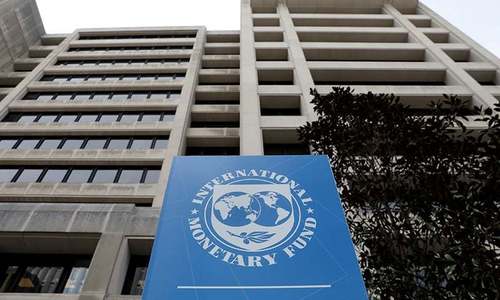• Lender’s acting chair advises ‘tight monetary policy’
• Govt required to raise power rates to meet Fund’s terms
• Miftah thanks PM for ‘taking tough decisions’; Shehbaz calls it outcome of ‘excellent team effort’
WASHINGTON: The Executive Board of the International Monetary Fund (IMF) on Monday completed the combined 7th and 8th reviews of a loan facility for Pakistan, allowing immediate disbursement of $1.1 billion to the country, said an official IMF announcement.
The statement pointed out that the disbursement “brings total purchases (money made available) for budget support under this arrangement to about $3.9 billion.”
This Extended Fund Facility (EFF) arrangement — signed in July 2019 — was to provide $6bn to Pakistan during a 39-month period. On Monday, the IMF board approved an extension of the programme until end-June 2023.
The board also approved “rephasing and augmentation” of Pakistan’s access to the funds by SDR720 million ($934m) that will bring the total access under the EFF to about $6.5bn.
The executive board also approved Pakistani authorities’ request for waivers of nonobservance of performance criteria.
“The immediate priority is to continue the steadfast implementation of the recently approved budget for FY23, adherence to a market-determined exchange rate, and pursuit of a proactive and prudent monetary policy,” said a statement issued by the IMF headquarters in Washington.
“It is also important to continue to expand social safety to protect the most vulnerable and accelerate structural reforms including to improve the performance of state-owned enterprises (SOEs) and governance,” the statement added.
The board noted that authorities in Pakistan have taken important measures to address the country’s worsened fiscal and external positions resulting from accommodative policies in FY22 and spillovers from the war in Ukraine. These two factors “have placed significant pressure on the rupee and foreign reserves,” the board noted.
IMF’s Deputy Managing Director and Acting Chair Antoinette Sayeh also issued a statement, observing that Pakistan’s “economy has been buffeted by adverse external conditions, due to spillovers from the war in Ukraine, and domestic challenges, including from accommodative policies that resulted in uneven and unbalanced growth”.
She reminded Pakistan “steadfast implementation of corrective policies and reforms” were “essential to regain macroeconomic stability, address imbalances and lay the foundation for inclusive and sustainable growth.”
She also supported the decision to tighten monetary conditions through higher policy rates, describing it as “a necessary step to contain inflation”.
Going forward, she advised continuing a tight monetary policy, which she said, “would help to reduce inflation and help address external imbalances,” adding that “maintaining proactive and data-driven monetary policy would support these objectives.”
The IMF official also advised a “close oversight of the banking system and decisive action to address undercapitalized financial institutions” as it would help support financial stability. “Preserving a market-determined exchange rate remains crucial to absorb external shocks, maintain competitiveness, and rebuild international reserves,” Ms Sayeh said.
The Fund advised Islamabad to accelerate structural reforms to strengthen governance and improve business environment as it would support sustainable growth. “Reforms that create a fair-and-level playing field for business, investment, and trade necessary for job creation and the development of a strong private sector are essential,” the board added.
In an earlier statement, Finance Minister Miftah Ismail congratulated the nation for getting IMF’s endorsement and thanked Prime Minister Shehbaz Sharif for “taking tough decisions” and “saving Pakistan from default”.
Praising the finance minister and his team, PM Sharif tweeted: “The formal resumption of an IMF programme is a major step forward in our efforts to put Pakistan’s economy back on track. It is outcome of an excellent team effort. I commend Finance Minister Miftah Ismail & his team and other stakeholders for their hard work.”
Ensuring provincial surpluses this fiscal year is a key requirement of an earlier agreement with the IMF for reviving the programme. Pakistan entered the IMF programme in 2019, but only half the funds has been disbursed to date as Islamabad struggled to keep targets on track.
The IMF made the last disbursement in February and the next tranche was to follow a review in March, but the government of ex-premier Imran Khan introduced costly fuel price caps, which threw fiscal targets and the programme off track. The new coalition government has removed the price caps, with petrol and diesel prices going up by as much as 66pc and 92pc in over a month. On June 21, Pakistani authorities and the IMF staff mission reached an understanding on the current federal budget to revive the stalled programme as the former committed to generating Rs436bn more taxes and gradually increasing petroleum levy to Rs50 per litre. An IMF staff review acknowledged that important progress had been made over the federal budget.
Later, Pakistan provided a written commitment from the provinces to provide Rs750bn in cash surplus to the Centre to contain the fiscal deficit within 4.9pc of GDP and help generate a Rs152bn primary fiscal surplus.
Pakistan is now required to increase electricity tariff by Rs7.91 per unit, besides direct pass-through of monthly fuel cost adjustments in a timely manner to meet IMF demands.
Published in Dawn, August 30th, 2022












































